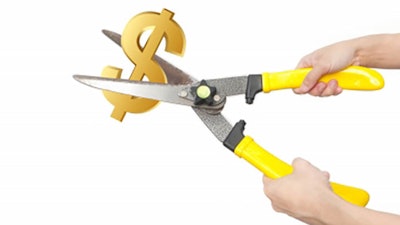
There are a host of reasons why a customer might object to your proposed estimate, yet there seems to always be the one objection that continues to stump many contractors. It’s the objection that says, “You’re just too high.” While this objection can be stated in various ways, what matters most is that you address it in a way that can win you work.
Consider a few reasons why a customer might say your bid is higher than other contractors.
- They are trying to see if you will come down a little to allow them to feel like they “got something extra” from you.
- Many customers believe that every contractor can always “give me” 5% - 10% off the initial bid price.
- The customer might prefer your quality results and reputation over another contractor but lowering your contract price by 3% - 5% would make it easier to sell their spouse, committee, or boss.
- The customer has a fixed budget and just cannot pay any more than a set figure.
- They are only looking for the lowest price.
- They are unconvinced of your unique advantages and benefits thus they don’t see why they should pay any more than the lowest bid.
Consider a few of the following responses you can use when a customer declares your price too high.
Objection #1
Customer: “Your bid is too high.”
Contractor: “I appreciate your honesty. We’ve been a quality contractor for many years, so I’m not surprised by your objection. However, when our customers realize what all we are doing for our price, they recognize what a tremendous deal they are receiving. Let’s look at your bid and discuss the reasoning behind our proposed work.”
This first objection begs to have more definition behind it. Don’t go soft at this point; they may have only looked at the price and not seriously vetted all that you are providing. Notice the last line in my response,
“Let’s look at your bid and discuss the reasoning behind our proposed work.”
Notice I said, “our proposed work,” rather than say, “our proposed price.” When your price is in question, you must transition the focus to your work. You’re selling quality work, and that comes at a higher price. Sixty to seventy percent of the time the customer has not really read all that the bid covers. Don’t cave in to this customer oversight.
Objection #2
Customer: “Your bid is higher than the other three bids I received.”
Contractor: “Thanks for gathering that many bids. That shows me you are serious about getting a good quality job. Many customers are not that patient to find the best contractor. Now, let’s look at where the other contractors are cheaper and determine what they are not providing you that we are.”
Your response to this price objection needs to be carefully crafted. To respond with something like, “Compared to what?” or “Well how much higher are we; I’ve got a little wiggle room” could send the wrong message and could cost you the job. Let’s look at why the first response is more productive.
I provide three compliments in my response:
- “Thanks for gathering”
- “you are serious”
- “Many customers are not that patient”
Such a response immediately takes any defensiveness from your tone and reassures the customer that you’re a real professional. Then, “let’s look at where the other contractors are cheaper…”, and, “…determine what they are not providing you…” are great teasers into undermining your competitors’ intentions without calling them out.
Many customers do not understand asphalt, sealcoating, “base,” or “2 inches of overlay.” They may be convinced that one bid is as good as another. This points to the need for you to “differentiate” your company, your quality reputation, and your cost/value benefits. If you cannot accomplish this, in the customer’s mind, you will struggle winning the project.
Objection #3
Customer: “If you can come down just another 3%-5%, I think we might have a deal.”
Contractor: “Wow, you are really looking for value for your dollar spent. Let’s compare our proposed work against what your other bids are charging you.”
Again, you want to congratulate the customer on taking a closer look at your bid and those of your competitors. However, their line, “…we might have a deal,” has suckered more contractors into lowering their price.
For the amateur pavement maintenance sales/estimator, the temptation to agree, thinking, “Ya, it’s just 3%,” can cost your company money if this becomes a pattern. Plus, doesn’t it seem like every job we lower our price “just another 3%” winds up causing our crews the most aggravation?
The response provided above is the right one as it refocuses the customer on value…not the 3%-5%. In most situations the value discovered might be in the fact that your crews tack the edges when the competitors do not; your crews place 2.5 inches to compact to the 2 inches bid while our competitors might lay 1.5 – 2 inches down, compacting to 1.5 – 1.75 inches.
Our crews might remove the parking blocks and replace while our competitors don’t even have this cost in their bid. It’s important to point out the differences that you feel present your bid, your work, and your company as the better choice by far.
Another small, but significant point to make on this last response is the phrase, “...what your other bids are charging you.” Whenever drawing distinctions while overcoming customer objections, be sure to use terms like, “costing you, charging you, requiring of you, etc.,” when referring to your competition.
Overcoming the cost objection is as old as the first contractor’s effort to win work. You must be confident but also wise in how you transition the customer’s seeming obsession with cost and move it to something that is really more important, like long-term quality results.
Hey, you may not win all of your customer objections, but you sure as heck can be better prepared to handle those price objections. Be proud of what your company provides and don’t sell it cheap.
Here’s to overcoming the price objection!



















